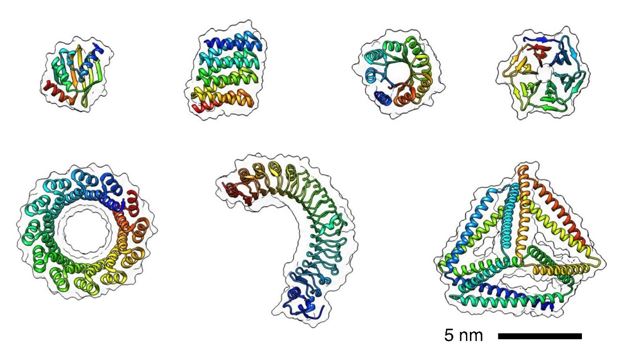Single-chain protein design can be viewed as the inverse protein folding problem: the goal is to find a sequence of amino acids that is compatible with a given backbone fold. Creative Biolabs has focused on the development of protein engineering services for many years and has established excellent protein engineering platforms for drug development. We provide a variety of protein engineering services to meet the diverse needs of our customers.
De novo design involves solving an even more complex problem, where neither the backbone nor the sequence is completely specified. Instead of features such as the desired size or fold type, the number of secondary structure elements is specified. The advantages are numerous: proteins can be designed with atomic accuracy for specific functions, such as scaffold support, specific binding or catalytic activity. Examination of protein three-dimensional structures suggests that complex tertiary folds and quaternary associations can be deconstructed into a limited number of secondary structural elements, such as strands, helices, and turns, which are assembled using loosely structured loops. To facilitate the formation of stable native-like de novo proteins, the lessons learned from the modular approach were applied to the design of single-chain proteins. This was accomplished by covalently linking together the individual elements of secondary structure.
 Fig.1 Schematic representation of de novo designed single-chain proteins.
Fig.1 Schematic representation of de novo designed single-chain proteins.
The approaches to the design of single-chain protein have been proved fruitful. We can provide the following three design services to meet customers’ specific requirements.
Studies have resulted in the formulation of a set of rules for the construction of stable helices. Strategies used in such design include (a) use of residues with large helix-forming propensities, (b) use of appropriate capping groups to remove terminal charges, (c) use of polar and charged amino acids to introduce stabilizing hydrogen bonds or ionic interactions between residues separated by one helical turn, (d) use of hydrophobic van der Waals interactions between residues separated by a turn of the helix, and (e) use of aromatic-charge or aromatic-sulfur interactions.
The construction of a stable β-turn is a prerequisite for β-hairpin formation. The analysis of β-hairpins in proteins reveals the specific requirements of turn stereochemistry for nucleating β-hairpins. For example, the amino acid conformational propensities in small connecting loops are found in β-hairpins. In addition, the β-sheet can be viewed as a tertiary structure, with complex geometry and interactions between residues far apart in primary sequence. Investigations of side chain-side chain interactions in the context of β-sheet formation do not reveal any strong preference.
The design of β-hairpins using DPro-Xxx sequences suggests that periodic insertion of these sequences into a polypeptide sequence should facilitate repeated chain reversal providing ready access to synthetic multiple-stranded sheets. In addition, the observation that Asn-Gly could nucleate β-hairpins has also been extended into the construction of three-stranded β-sheets. Such threes-stranded β-sheets have been applied to the study of the factors governing β-sheet folding and to assay the role of cooperativity along individual hairpins constituting a sheet and across strands of a β-sheet.
Creative Biolabs has focused on the development of protein engineering for years, and we whole-heartedly cooperate with you to accomplish our shared goals. Our team provides you with outstanding support and meets your specific needs with a professional technology platform. If you are interested in our services, please contact us for more details.
All listed services and products are For Research Use Only. Do Not use in any diagnostic or therapeutic applications.